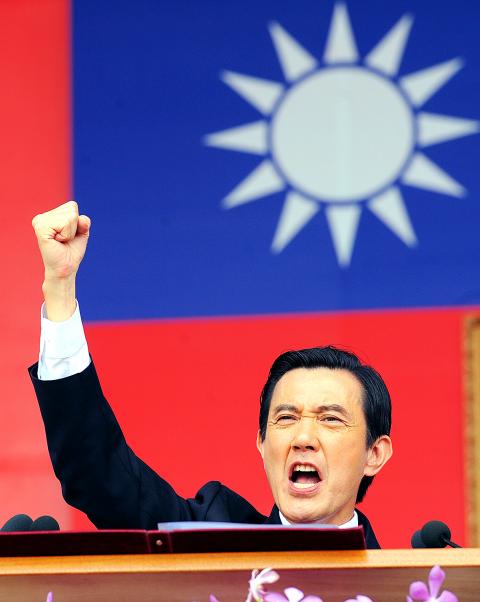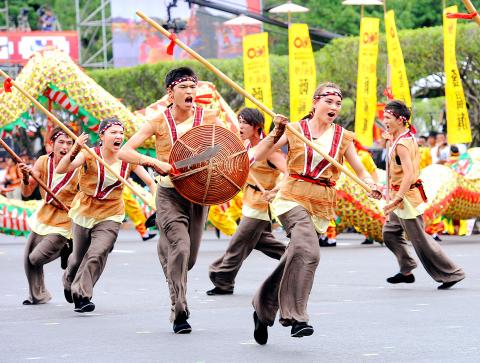President Ma Ying-jeou (馬英九) yesterday called on the People’s Republic of China (PRC) to model itself on the Republic of China (ROC), which he said “remade itself in Taiwan” during the past six decades.
Yesterday marked the centennial of the beginning of the Xinhai Revolution, which ended imperial rule in China and led to the establishment of the ROC by Sun Yat-sen (孫逸仙).
Chinese President Hu Jintao (胡錦濤) on Sunday made an appeal for unification with Taiwan, saying Taiwan and China should achieve “the great rejuvenation of the Chinese nation” together.

Photo: Fang Pin-chao, Taipei Times
Hu’s speech was characterized by the Democratic Progressive Party (DPP) as a “stark denial” of the assertion under the so-called “1992 consensus” that each side could have its own interpretation of “one China.” The consensus has been a cornerstone of Ma’s cross-strait policy.
Ma’s Double Ten National Day speech did not respond to Hu’s call, but toward the conclusion, Ma said: “The republic’s road ahead and Taiwan’s future lie in the hands of our 23 million people.”
However, like Hu, Ma used the same term Zhonghua minzu (中華民族) when he described the people of both sides of the Taiwan Strait, while the official English version of his speech translated the term as “ethnically Chinese.”

Photo: Fang Pin-chao, Taipei Times
Titled “A Century of Struggle, a Democratic Taiwan,” Ma divided his speech into three parts — “Why we commemorate the Xinhai Revolution,” “The ROC remakes itself in Taiwan” and “New prospects to unfold with a golden decade.”
Commemorating the Xinhai Revolution, which he called “a memory and heritage shared by both sides of the Taiwan Strait,” Ma encouraged China to “courageously move in the direction” of a free and democratic nation set by Sun.
Ma also urged China to “face the existence of the Republic of China head-on” as the ROC’s existence “is referred to not in the past tense, but in the present.”
“Had it not been for the retrocession of Taiwan from Japan to the republic, the setbacks encountered by ROC armed forces in the civil war against the communists in mainland China might have spelled the death of the republic more than six decades ago, with no chance for a transformative rebirth or possibility of development of the two sides of the Strait along different trajectories,” Ma said.
The ideals that Sun sought in establishing the republic were not achieved in China during his lifetime, but have come to full fruition in Taiwan, with Taiwanese now enjoying freedom, democracy and affluence, Ma said.
The country has cultivated an image that is “free and democratic; robust and innovative; caring and compassionate; and globally engaged and self-confident,” Ma said, citing various individuals and their stories as examples.
Turning to the future, Ma reiterated his campaign pledge and slogan that he would usher in a “golden decade” of prosperity in his second term if he were re-elected.
“In the face of the pressure of global competition, the next decade will be a critical period for us. We must strive to fully realize our vision for a golden decade. We must remain confidently engaged with the world, pursuing development through innovation, and moving forward in the spirit of social justice,” he said.
Ma said the 15 agreements his administration has signed with China since May 2008 all conformed to the principle of “parity, dignity and reciprocity, while putting Taiwan first for the benefit of its people.”
“The people on both sides of the Taiwan Strait are ethnically Chinese. Our hope is that the two sides will be able — based on a clear-eyed appreciation and acceptance of reality — to seek common ground, while respecting differences, assist and cooperate with each other, and build a peaceful relationship within an institutionalized framework,” he said.
Ma said that this month also bore special significance for him on a personal level.
“Sixty years ago in October 1951, at a time of great turmoil, my parents brought their family, including one-year-old me, from Hong Kong to Taiwan, seeking a life of freedom and tranquility. Never could they have imagined that more than 50 years later, their son would have the opportunity to become the ROC president,” Ma said.
At a separate event later in the day, Ma told a gathering of China-based Taiwanese businesspeople that the country had become an asset to the world, not a liability.
Ma said building a peaceful relationship with China within an institutionalized framework was the nation’s first line of defense, which was more important than procuring F-16C/D aircraft.

A Chinese aircraft carrier group entered Japan’s economic waters over the weekend, before exiting to conduct drills involving fighter jets, the Japanese Ministry of Defense said yesterday. The Liaoning aircraft carrier, two missile destroyers and one fast combat supply ship sailed about 300km southwest of Japan’s easternmost island of Minamitori on Saturday, a ministry statement said. It was the first time a Chinese aircraft carrier had entered that part of Japan’s exclusive economic zone (EEZ), a ministry spokesman said. “We think the Chinese military is trying to improve its operational capability and ability to conduct operations in distant areas,” the spokesman said. China’s growing

Taiwan yesterday denied Chinese allegations that its military was behind a cyberattack on a technology company in Guangzhou, after city authorities issued warrants for 20 suspects. The Guangzhou Municipal Public Security Bureau earlier yesterday issued warrants for 20 people it identified as members of the Information, Communications and Electronic Force Command (ICEFCOM). The bureau alleged they were behind a May 20 cyberattack targeting the backend system of a self-service facility at the company. “ICEFCOM, under Taiwan’s ruling Democratic Progressive Party, directed the illegal attack,” the warrant says. The bureau placed a bounty of 10,000 yuan (US$1,392) on each of the 20 people named in

Nine retired generals from Taiwan, Japan and the US have been invited to participate in a tabletop exercise hosted by the Taipei School of Economics and Political Science Foundation tomorrow and Wednesday that simulates a potential Chinese invasion of Taiwan in 2030, the foundation said yesterday. The five retired Taiwanese generals would include retired admiral Lee Hsi-min (李喜明), joined by retired US Navy admiral Michael Mullen and former chief of staff of the Japan Self-Defense Forces general Shigeru Iwasaki, it said. The simulation aims to offer strategic insights into regional security and peace in the Taiwan Strait, it added. Foundation chair Huang Huang-hsiung

PUBLIC WARNING: The two students had been tricked into going to Hong Kong for a ‘high-paying’ job, which sent them to a scam center in Cambodia Police warned the public not to trust job advertisements touting high pay abroad following the return of two college students over the weekend who had been trafficked and forced to work at a cyberscam center in Cambodia. The two victims, surnamed Lee (李), 18, and Lin (林), 19, were interviewed by police after landing in Taiwan on Saturday. Taichung’s Chingshui Police Precinct said in a statement yesterday that the two students are good friends, and Lin had suspended her studies after seeing the ad promising good pay to work in Hong Kong. Lee’s grandfather on Thursday reported to police that Lee had sent